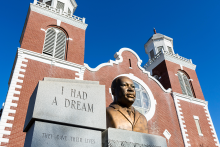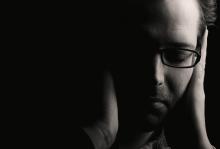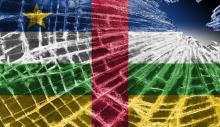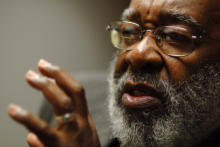Beyond Vietnam

We can honor King’s vision by working to restore the voting rights that he knew were so central to dismantling racism in this country. As King proclaimed, “Voting is the foundation stone for political action.”

Deaf white ears, children. Deaf white ears. That's what we have. Freedom is freedom for all or it's simply not freedom and Jesus still hangs on that cross today just as truly as he did all those years ago.

This weekend we’ll commemorate the too-short life and great work of Dr. Martin Luther King Jr. While we rightly celebrate his life dedicated to advancing equality for all, too often we overlook his call to peacemaking. This year, in light of conflicts in Syria, South Sudan, and an often-overlooked war in Central African Republic, we should remember his words.
In his 1967 speech, “Beyond Vietnam — A Time to Break Silence,” King opposed the violence, saying:
"To me the relationship of this ministry [of Jesus Christ] to the making of peace is so obvious that I sometimes marvel at those who ask me why I'm speaking against the war. Could it be that they do not know that the good news was meant for all men — for Communist and capitalist, for their children and ours, for black and for white, for revolutionary and conservative?"
Those aware of our long history at Sojourners know that we have always been committed to peace, to opposing unjust wars and finding nonviolent solutions wherever possible. And in all the work we do, we aim to speak out for the least of these, the poorest and most vulnerable.

Vincent G. Harding wrote the speech Martin Luther King Jr. delivered exactly one year before King was assassinated.

This article originally appeared in the January 1983 issue of Sojourners.
Somehow Martin King refuses to die within us, among us. Fifteen years after it was delivered, his historic Riverside Church speech, "Beyond Vietnam," reappears and thrusts upon us a King we had largely chosen to forget. Even now it would be tempting to take this cry from the heart of a driven, searching, magnificent brother and file it away as a document for museums and other honorable places.
But neither the fiery signals rising from some of our latest potential Vietnams in Central America, South Africa, or the Middle East, nor the mounting anguish of the betrayed and disinherited of our own land will allow us to escape the unresolved issues of the past or avoid the costly and accurate vision of our comrade in the faith. The speech not only requires us to struggle once more with the meaning of King, but it also presses us to wrestle as he did, with all of the tangled, bloody, and glorious meaning of our nation (and ourselves), its purposes (and our own), its direction (and our own), its hope (and our own).
Recently the name of Martin Luther King Jr. has been in the public arena primarily as the person whose birthday should or should not become a legal holiday. But this rather smoothed-off, respectable national hero is not the King of "Beyond Vietnam." Those who have, with all the best and most understandable intentions, pressed for King's birthday as an official holiday seem to have enshrined the King of 1963. In a way, that is a more comfortable image for us all: the triumphant King of the March on Washington, calling a nation and a world to a magnificent dream of human solidarity.
But all that,was before the assassins' bombs ripped out the life of the Sunday School children in Birmingham, before the fires of rebellion scourged the northern cities and moved King into Chicago, before the cry of black power was raised, before courageous and radical spokespersons like Malcolm X and the leaders of the Student Non-Violent Coordinating Committee (SNCC) had begun to testify against the steadily rising tide of destructive U.S. imperialism in Vietnam, before King decided to break what he called the silence of betrayal and speak his own truth concerning his nation's role in Vietnam and in all the world's non-white revolutionary struggles.
Sometimes we wish to forget that by April 1967, King was a beleaguered public figure. He had refused to join the fearful litany of condemnation mounted by the civil rights establishment against the militant demand for black power, and for that he was fiercely attacked by moderates and liberals. On the other hand, some of the younger black and white radicals seemed to think that their best contributions to revolution were measured by the harshness of their criticism of King's nonviolence and "moderation."